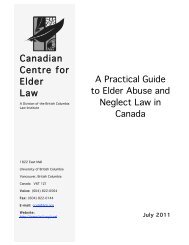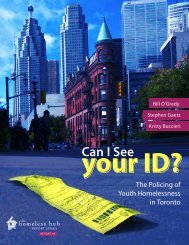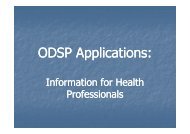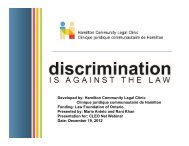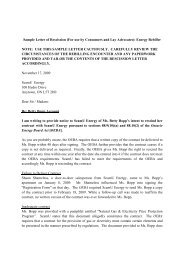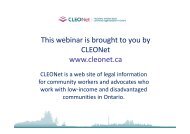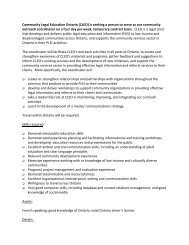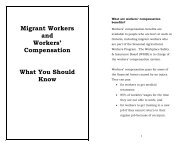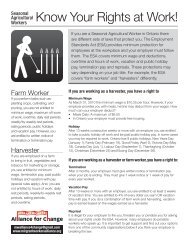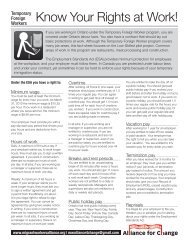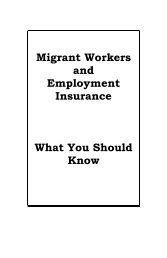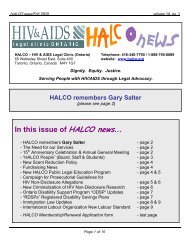Newsletter Vol 16 Fall 2010 - Your Legal Rights
Newsletter Vol 16 Fall 2010 - Your Legal Rights
Newsletter Vol 16 Fall 2010 - Your Legal Rights
You also want an ePaper? Increase the reach of your titles
YUMPU automatically turns print PDFs into web optimized ePapers that Google loves.
Inside This Issue<br />
Page 2<br />
∗<br />
∗<br />
∗<br />
∗<br />
∗<br />
Getting an Inheritance While Receiving<br />
ODSP Benefits<br />
Page 3<br />
∗<br />
∗<br />
∗<br />
∗<br />
Spotlight on Specialty Clinic<br />
Social Assistance Rate Increase<br />
Cherryholme Decision<br />
Court of Appeal Decision<br />
RDSP’s<br />
Page 4<br />
∗<br />
∗<br />
∗<br />
∗<br />
Rose of Durham<br />
DCLC Celebrates 25 Years<br />
Maintenance<br />
Our AGM<br />
Our Staff and Board of Directors<br />
Milestones<br />
Staff Profile<br />
DCLC Celebrates 25 Years!<br />
Madame Justice Fran Kiteley was<br />
the keynote speaker for the event<br />
and Board President Stephen<br />
Bourque was the MC for the Anniversary<br />
celebration which took place on<br />
September <strong>16</strong>, <strong>2010</strong>.<br />
Affidavits<br />
The Durham Community <strong>Legal</strong><br />
Clinic has two Commissioner for<br />
Taking Oaths on staff.<br />
Come into the clinic before 4pm,<br />
Monday to Friday if you have a<br />
document that needs to be sworn<br />
in front of a commissioner. Such<br />
documents include: Adult Name<br />
Change, Affidavits for OSAP,<br />
Statutory Declarations for Lost<br />
Passports, Affidavits for Service<br />
etc.<br />
DCLC NEWSLETTER<br />
Durham Community <strong>Legal</strong> Clinic<br />
Oshawa Centre, 419 King Street West, Unit 3512<br />
Oshawa, ON L1J 2K5<br />
Phone: 905-728-7321; Toll-free: 1-888-297-2202<br />
www.durhamcommunitylegalclinic.ca<br />
DCLC<br />
<strong>Vol</strong>ume <strong>16</strong>, <strong>Fall</strong>, <strong>2010</strong><br />
November <strong>2010</strong><br />
Getting an Inheritance While Receiving ODSP Benefits<br />
If you are an ODSP recipient and you inherit money or property, this inheritance<br />
may affect your continued eligibility to receive further Ontario<br />
Disability Support Program (ODSP) benefits.<br />
In order to be eligible to receive ODSP income support, a recipient cannot<br />
have income over a certain level. Nor can the recipient have assets worth<br />
more than a certain amount. However, some income and assets are exempt.<br />
This means that ODSP does not count them when they calculate<br />
your income and assets, one example of this is an inheritance placed in a<br />
trust fund. An inheritance of up to $100,000 will not count as an asset if it<br />
is placed in a trust.<br />
A trust may be set up in a will that provides for your inheritance or after an<br />
inheritance is received, this includes proceeds from a life insurance policy.<br />
Funds from an inheritance or proceeds from a life insurance policy received<br />
directly by a recipient and subsequently placed in a trust (not a discretionary<br />
trust) are treated as income in the month received. These funds<br />
are exempt as assets thereafter, provided that the trust is established as<br />
soon as possible. An ODSP recipient who receives an inheritance and<br />
intends to place that money in a trust fund may be given up to six months<br />
to do so.<br />
Funds placed in trust as a provision of a will are not considered income in<br />
the month received. In these cases, a copy of the will must be reviewed to<br />
determine whether the funds are available to the person for his/her maintenance.<br />
There are a number of trusts which are recognized for ODSP purposes,<br />
these include a trust derived from an inheritance or life insurance policy, a<br />
discretionary/Henson Trust and a private trust.<br />
A trust derived from inheritance or life insurance and available for maintenance<br />
may be established either by the terms of a will or by a member of<br />
a benefit unit with money received from an inheritance or from the proceeds<br />
of a life insurance policy. This type of trust is exempt as an asset<br />
subject to the $100,000 limit. The $100,000 limit applies to the capital<br />
value of the trust derived from an inheritance or life insurance policy, plus<br />
the cash surrender value of any life insurance policies held by a member<br />
of the benefit unit. Continued on page 2<br />
Disclaimer: This newsletter provides general legal information for the benefit of our readers. Although we strive to ensure the accuracy of the information<br />
as of the date of printing, laws may change, and/or the application of these laws may vary in individual circumstances. For assurance that our information,<br />
and your interpretation of it, is appropriate to your particular situation, please obtain legal advice.
<strong>Vol</strong>ume <strong>16</strong> <strong>Fall</strong> <strong>2010</strong><br />
Getting an Inheritance While Receiving<br />
ODSP Benefits<br />
Spotlight on a Specialty Clinic<br />
HIV and AIDS <strong>Legal</strong> Clinic Ontario<br />
Continued from page 1<br />
A discretionary trust, e.g. Henson Trust, gives the trustee absolute and<br />
sole discretion regarding payments from the trust to the beneficiary.<br />
The trustee is not obligated to make the funds available to the person<br />
for his/her maintenance or support. A true absolute discretionary trust is<br />
not considered an asset for ODSP purposes; therefore the capital value<br />
of such a trust can be in excess of $100,000.<br />
A private trust may be derived from an award, settlement or gift and not<br />
from an inheritance or proceeds of a life insurance policy. A private<br />
trust can be established by a living person for the benefit of another<br />
person (often a relative or friend) and is administered by a trustee.<br />
Depending on the terms of the trust, funds may or may not be available<br />
to the person for his/her maintenance or they may be absolute discretionary<br />
trusts that are not part of a will. These trusts are normally considered<br />
an asset if the trustee is able to encroach on the capital for the<br />
person's maintenance, otherwise they are not an asset.<br />
Interest earned on a trust is exempt as income if it is reinvested into the<br />
capital of the trust and the value of the trust does not exceed the maximum<br />
permitted. The interest may also be exempt if it is used for approved<br />
disability related items or services or education or training expenses<br />
incurred because of a disability.<br />
ODSP recipients who have trust funds should know that there are reporting<br />
obligations to which they must adhere in order to ensure that<br />
monies from the trust are exempt when calculating their income. For<br />
example, the ODSP recipient or his/her trustee may be required to<br />
provide an annual report to ODSP showing all payments to and from<br />
the trust.<br />
Court of Appeal Decision<br />
HALCO- HIV and AIDS <strong>Legal</strong> Clinic is a charitable<br />
not for profit community based legal clinic which provides<br />
free legal assistance to people living with or<br />
affected by HIV/AIDS in Ontario.<br />
HALCO is funded by <strong>Legal</strong> Aid Ontario, the AIDS<br />
Bureau of the Ontario Ministry of Health and Long<br />
term Care and the ACT Community Partner’s Fund.<br />
HALCO was founded in 1995 and the demand for<br />
their services has continued to grow. Their staff provide<br />
legal advice and representation, engage in law<br />
reform, public legal education and community development<br />
initiatives.<br />
For more information contact HALCO at 1-888-705-<br />
8889 or visit their website at www.halco.org<br />
Director ODSP v. Cherryholme, <strong>2010</strong> OSCJ 3259<br />
(CanLII)<br />
The Ontario Court of Appeal has recently ruled that s. 5 (2) of the<br />
Ontario Disability Support Program Act was contrary to the Human<br />
<strong>Rights</strong> Code. This decision confirms that people who are disabled<br />
because of a drug or alcohol addiction may be entitled to ODSP<br />
benefits. This has been a long standing legal dispute dating back to<br />
the late 1990’s.<br />
The Government’s position has been that s 5(2) did not create a true<br />
disadvantage because excluded applicants were directed to the Ontario<br />
Works program. The Court however agreed with the Social<br />
Benefits Tribunal decision that it did in fact create a true disadvantage<br />
in that it denied income support and imposed restrictions because<br />
of assumed or unjustly attributed characteristics.<br />
We strongly advice those of you are applying for or those of you<br />
working with someone who is applying for Ontario Disability contact<br />
the Durham Community <strong>Legal</strong> Clinic for assistance.<br />
Social Assistance Rate Increase<br />
Ontario Works and Ontario Disability rates are set to increase by 1% on<br />
November 1, <strong>2010</strong>. Currently a single person on ODSP gets a maximum<br />
monthly cheque of $1042. This will now increase to $1053.<br />
A single Ontario Works recipient will see an increase from $585 to<br />
$592.<br />
This was an appeal by the Director, Ontario Disability Support Program<br />
(“ODSP”) from the decision of the Social Benefits Tribunal (“The<br />
Tribunal,”) which was affirmed on application for reconsideration. In<br />
the decision rendered by the Tribunal, the Respondent, Mr. Cherryholme,<br />
was found to be a person with a disability within the meaning<br />
of s.4(1) of the Ontario Disability Support Program Act, 1970, S.O.<br />
1997, SCH.B.<br />
In the case at bar, the issues before the Divisional Court were:<br />
1. Did the Tribunal err in law by finding the respondent to be a person<br />
with a disability, without making a finding as to whether there was<br />
verification of a restriction in activities of daily living<br />
2. Did the Tribunal err in law by finding there was a “substantial impairment”<br />
on oral evidence, disregarding the medical evidence<br />
3. Did the Tribunal err by considering irrelevant factors<br />
In its decision, the Divisional Court noted that the only medical evidence<br />
before the Tribunal regarding the restrictions in activities of<br />
daily living was the Health Status Report which was completed by the<br />
Respondent’s physician. In this report, the doctor listed depression as<br />
the only condition from which the Respondent suffered. Panic attack<br />
was noted as the impairment and the restriction was listed as, “unable<br />
to sleep more than four hours at a time. Daily headaches. ”<br />
The doctor noted no symptoms or signs in six categories and minimal<br />
signs or symptoms in seven categories, on the Emotional Wellness<br />
Scale where signs of intellectual or psychological conditions in13<br />
areas can be listed. With respect to the activities of daily living, the<br />
doctor indicated all 24 categories listed were within normal limits.<br />
Con’t on pg 3
<strong>Vol</strong>ume <strong>16</strong> <strong>Fall</strong> <strong>2010</strong><br />
DID YOU KNOW….<br />
RDSP’s<br />
The Registered Disability Savings Plan is a long<br />
term saving plan to help Canadians with disabilities<br />
save for the future. You should consider opening<br />
an RDSP if you have a long term disability and are<br />
under the age of 60, are a Canadian resident with a<br />
Social Insurance Number, are eligible for the Disability<br />
Tax Credit and are looking for a long term<br />
savings plan.<br />
There is no annual contribution limit to the RDSP<br />
but there is a lifetime contribution limit of $200,000.<br />
Anyone can contribute to an RDSP if they get written<br />
consent of the RDSP holder. The deadline for<br />
contributions each year is December 31 st .<br />
There is no impact on federal benefits such as the<br />
Canada Child Tax Benefit, the Goods and Services<br />
Tax Credit, Old Age Security, and Employment Insurance.<br />
RDSP’s will have little or no impact on<br />
social assistance payments.<br />
To help you save, the Government pays a matching<br />
grant of up to $3500 depending on the amount contributed<br />
and your family income. Earnings accumulate<br />
tax free until the money is taken out of the<br />
RDSP. To encourage savings, grants and bonds<br />
must remain in the RDSP for at least 10 years.<br />
Con’t from pg 2<br />
The Divisional Court noted that although the Tribunal referred to<br />
the medical evidence in support of Mr. Cherryholme’s claim as<br />
being weak, it accepted his evidence he was reluctant to provide<br />
to his physician with a true picture of his emotional status because<br />
his estranged wife was an employee in the doctor’s office<br />
and he did not wish her to know of his emotional disability. The<br />
Tribunal then accepted Mr. Cherryholme’s self-assessment of<br />
emotional disability and restrictions in his daily living activities.<br />
Holding:<br />
The Divisional Court emphasized that the mandatory verification<br />
requirement applied to restrictions, as well as impairments and<br />
durations, and that the Tribunal was required to make a finding<br />
as to the existence of the required verification of restrictions.<br />
In its decision, the Court determined that “there was virtually no<br />
credible medical evidence before the Tribunal in support of the<br />
claim for disability and the required verification by a qualified<br />
person was utterly lacking.” It went on to say that, the Tribunal<br />
erred in law by failing to make a finding of verification by a prescribed<br />
professional of any restrictions in activities in daily living<br />
is in our opinion an error in law.”<br />
Local Agency Spotlight<br />
Rose of Durham<br />
Rose of Durham got its start in 1988 when a group of<br />
women who belonged to the Catholic Church saw a<br />
need in the community to support young mothers. Today,<br />
Rose of Durham is a charitable, non-profit organization<br />
which offers supportive counselling and programming<br />
to young parents in Durham Region, they<br />
serve over 400 clients a year. This includes females<br />
under the age of 25, and males under the age of 30.<br />
Programs cover a variety of parenting needs through<br />
a Dad's Group, Cooking class, Parenting 101, Mommy<br />
& Me, Little Hands, Teen Parent School Program, Prenatal<br />
classes, and more. Programs focus on the importance<br />
of attachment with your baby and basic parenting<br />
skills. They also provide individual, supportive counselling<br />
with professional staff. With it’s main branch in Oshawa<br />
and It’s outreach workers in Ajax, Pickering, Beaverton<br />
and Uxbridge, They are able to serve young parents<br />
in need all over Durham. To find out more about<br />
services, to make a donation or to volunteer please visit<br />
roseofdurham.com<br />
Maintenance<br />
When you come across a maintenance issue in your unit, the<br />
first thing you should do is notify your landlord in writing,<br />
and keep a copy for your records.<br />
The Residential Tenancies Act says that it is the landlords<br />
responsibility to maintain the rental unit and to comply with<br />
health, safety, housing and maintenance standards.<br />
If, after you make the landlord aware of the issue in your unit,<br />
and nothing is done about it, you can file a T6 Application<br />
about Maintenance with the Landlord and Tenant Board. The<br />
fee for this application is $45.00<br />
On the day of your hearing, you will have the opportunity to<br />
try and mediate with your landlord before you go to a hearing.<br />
Mediation is voluntary and if it doesn’t work out, you will<br />
proceed to a hearing.<br />
You should come prepared to the hearing with 3 copies of<br />
any evidence you will be relying on to prove what you have<br />
claimed in your application, such as pictures, receipts and a<br />
copy of any paperwork you have that notifies the landlord of<br />
the maintenance issues claimed in your application.<br />
If you are having issues with maintenance, call DCLC @<br />
(905) 728-7321.
<strong>Vol</strong>ume <strong>16</strong> <strong>Fall</strong> <strong>2010</strong><br />
Durham Community <strong>Legal</strong> Clinic’s Annual General Meeting<br />
Our AGM was held on September <strong>16</strong>, <strong>2010</strong> at the New Courthouse in Oshawa. Several Community Agencies and Clinic supporters<br />
where on hand to join the celebration. The membership and Board voted on a minor change to our By-law, Minutes from last<br />
meeting and voted in a new member to our Board of Directors, Audrey Andrews. We would like to welcome Audrey and we look<br />
forward to having her as part of the Board.<br />
Board of Directors<br />
There have been some changes to the Durham Community<br />
<strong>Legal</strong> Clinic Board of Directors .<br />
Stephen Bourque<br />
Self-Employed, Chair<br />
Paul Dobbs<br />
John Howard Society, Vice-Chair<br />
Lynn Lunt<br />
Self Employed Bookkeeper, Treasurer<br />
Raedah Abdullah<br />
Community Development Council Durham, Board<br />
Member<br />
Audrey Andrews<br />
Region of Durham, Board Member<br />
Allyce Mutungi<br />
Lawyer, Board Member<br />
Christine Vos<br />
Community Living Oshawa/Clarington, Board Member<br />
Mark Bouwmeester<br />
Durham Mental Health Services, Board Member<br />
Kelly Weeks,<br />
Canadian Mental Health Association, Board Member<br />
Virginia Harwood<br />
Durham College, Board Member<br />
Jonathon Dixon<br />
OUR STAFF<br />
Deborah Hastings, Executive Director<br />
Gia Williams, Staff Lawyer<br />
Cathy Duignan, Community <strong>Legal</strong> Worker<br />
Stefanie Famme, Community <strong>Legal</strong> Worker<br />
Emily Robb, Tenant Duty <strong>Legal</strong> Worker<br />
Lisa Petit, Support Staff<br />
Colleen Twyman, Support Staff<br />
Michele Prescott, Office Manager<br />
Region of Durham, Board Member<br />
Milestones<br />
This year marked significant milestones for two of the Durham Community<br />
<strong>Legal</strong> Clinic staff.<br />
Cathy Duignan, community legal worker/paralegal is celebrating 20<br />
years with the Durham Community <strong>Legal</strong> Clinic. Cathy began working<br />
with the Clinic in 1990 as support staff and over the years worked her<br />
way to community legal worker.<br />
Deborah Hastings is celebrating 10 years with the Durham Community<br />
<strong>Legal</strong> Clinic. Deborah has been the Executive Director of DCLC since<br />
2000 and has brought about many positive changes.<br />
We would like to thank both Deborah and Cathy for their dedication,<br />
hard work and commitment to the <strong>Legal</strong> Clinic. Congratulations to you<br />
both on your success.<br />
Staff Profile– Lisa Petit, Senior Support Staff<br />
Lisa Petit joined the Durham Community <strong>Legal</strong> Clinic in 2003.<br />
She is the senior support staff person and is responsible for intake<br />
and providing administrative assistance to all of the legal<br />
workers. Lisa is also an appointed Commissioner of Oaths as<br />
well as the backup tenant duty legal worker. Lisa is involved in<br />
the majority of the Clinic’s outreach activities each year.<br />
Prior to joining the Durham Community <strong>Legal</strong> Clinic Lisa graduated<br />
from the <strong>Legal</strong> Administration Program and worked as a<br />
Property Manager.<br />
The aspect of her job that Lisa enjoys the most is providing people<br />
with advice and knowing she helped them in their time of<br />
need<br />
The Durham Community <strong>Legal</strong> Clinic provides free legal<br />
advice to low income residents of the Durham Region in the<br />
following areas:<br />
*Disability Issues *Ontario Human <strong>Rights</strong><br />
*Income Maintenance *Criminal Injuries Compensation<br />
*Tenant Issues *Employment Insurance Appeals<br />
*WSIB<br />
* And more...<br />
*Wills and Powers of Attorney




